Navigation
Water is a precious resource many take for granted until there is too little or too much. Scientists and engineers have positioned instruments at the Susquehanna Shale Hills Observatory at Pennsylvania State University to learn much more about the water cycle there. It is one of six Critical Zone Observatories in the United States.
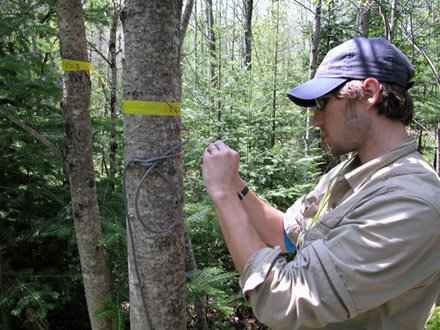 |
| Researchers wanted to know if trees closer to the wetland used more water than ones that were further away. To figure this out, they picked 150 trees and, by putting sensors into the tree-trunks, measured how much water each one used. Photograph by D. |
- Agriculture
- Amazon
- anthropogenic sources of water pollution
- anti-biotic resistant bacteria
- chemical pollutants
- child survival
- controlling water pollutants
- demography
- dengue
- disease prevention
- drought
- ecosystem services
- geographic distribution of disease vectors
- Global climate change
- guinea worm disease
- HCWH water
- health care
- household water treatment and safe storage
- HUdson River
- human rights
- HWTS
- hygiene
- infectious diarrhea
- kinship
- malaria
- malnutrition
- MDG
- mercury
- Mexico
- naturally occurring water pollutants
- nutrition
- ocean pollution
- onchocerciasis
- PCBs
- sanitation
- Schistosomiasis
- shigellosis
- soil-transmitted helminths
- success sanitation projects
- toxic cyanobacteria
- trachoma
- UN Millennium Development Goals
- undernutrition
- water crisis
- water services
- Desertification
- Global Climate Change
- Global Health
- News and Special Reports
- Oceans, Coral Reefs
- Pollution
- Population
- Public Health
- Sanitation
- Toxic Chemicals
- Water
- Water and Sanitation
The drought and famine once again blighting the Horn of Africa brings with it an unwelcome reminder that for all of mankind’s achievements we are yet to eradicate the scourge of poverty or to provide clean water, sanitation or basic health care for the world’s most desperate people.
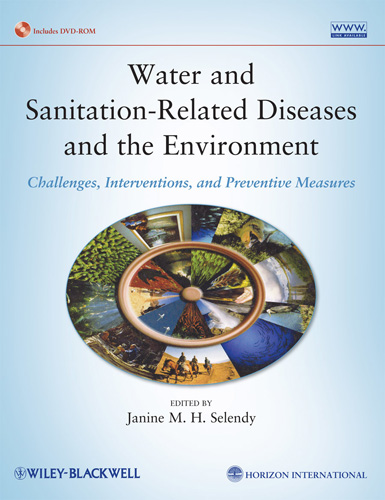
With support from the National Science Foundation (NSF), Stacey Combes, a biomechanist at Harvard University, and her team are studying how dragonflies pull off complicated aerial feats that include hunting and mating in mid-air.
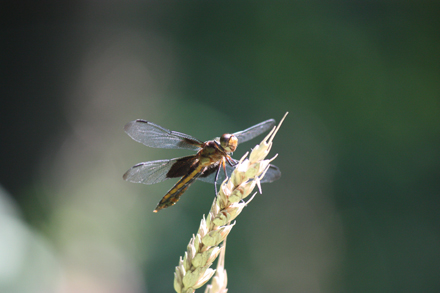 |
| Dragonfly in New York State, July 2011 Photograph by Janine Selendy |
Next time you see a dragonfly, try to watch it catch its next meal on the go. Good luck!
***Dragonflies in flight video at botom of article***
- bacteria
- Deepwater Horizon
- ethane
- Gulf of Mexico
- hydrocarbons
- microbes
- natural gas
- oil
- oil spills
- PNAS
- Proceedings of the National Academy of Sciences
- propane
- U.S. National Science Foundation (NSF)
- UCSB
- University of California at Santa Barbara
- Energy
- Global Climate Change
- Pollution
- Toxic Chemicals
- Waste Management
- Water
In the results of a new study, scientists explain how they used DNA to identify microbes present in the Gulf of Mexico following the Deepwater Horizon oil spill and the particular microbes responsible for consuming natural gas immediately after the spill.
 |
| Flares of captured gas (left) and oil (right) at the Deepwater Horizon spill site in June 2010. |
The Republic of the Marshall Islands is now home to the world’s largest shark sanctuary. The Nitijela, the Marshallese parliament, unanimously passed legislation last week that ends commercial fishing of sharks in all 1,990,530 square kilometers (768,547 square miles) of the central Pacific country’s waters, an ocean area four times the landmass of California.
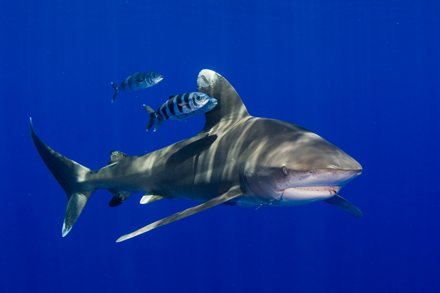 |
| Some species, such as the oceanic white tip, have experienced declines of up to 99 percent. Due to their life history characteristics of slow growth, late maturity, and production of few young, sharks are exceptionally vulnerable to overexploitation and slow to recover once depleted. |
Nutrition experts at Harvard School of Public Health (HSPH) in conjunction with colleagues at Harvard Health Publications have unveiled the Healthy Eating Plate, a visual guide that provides a blueprint for eating a healthy meal.
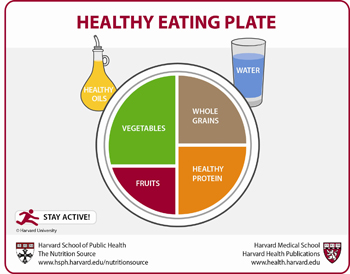 |
African ranchers often prefer to keep wild grazers like zebras off the grass that fattens their cattle. But a new study by Kenyan and University of California at Davis researchers shows that grazing by wild animals doesn't always harm, and may sometimes benefit, cattle.
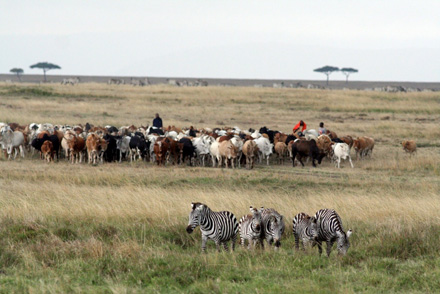 |
| Grazing by wild animals doesn't always harm, and may benefit, livestock like cattle. Photograph by Rob Pringle |
African ranchers often prefer to keep wild grazers like zebras off the grass that fattens their cattle.
Doctors Without Borders/Médecins Sans Frontières (MSF) is currently battling outbreaks of cholera and measles in and around the town of Marere in southern Somalia.
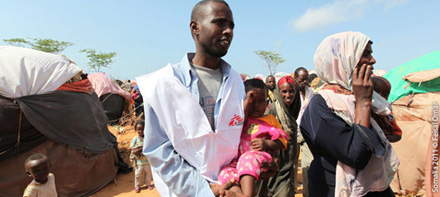 |
| Somalia: Battling the consequences of conflict, neglect and drought. Photograph courtesy of MSF |
The EPA is observing Pollution Prevention (P2) Week, September 19-25, 2011, by launching a new tool designed to provide Americans easy access to information about everyday products like home appliances, electronics and cleaning products that can save money, prevent pollution and protect people’s health.
Alison Bick has developed a low-cost portable method to test water quality using a mobile phone.
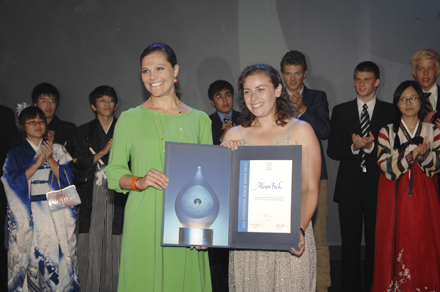 |
| H.R.H. Crown Princess Victoria of Sweden, the Patron of the Stockholm Junior Water Prize, presents the award to Stockholm Junior Water Prize winner Alison Bick at a ceremony that took place during the World Water Week in Stockholm. |
Matt Rand, director of Global Shark Conservation for the Pew Environment Group, issued the following statement on 7 September 2011 in response to the shark sanctuary designation made by Tokelau, an island territory in the South Pacific.
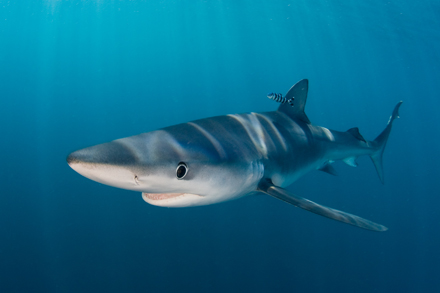 |
| Blue sharks (Prionace glauca), seen here, tiger sharks (Galeocerdo curvier), Oceanic whitetip shark (Carcharhinus longimanus), and whale sharks (Rhincodon typus) can be found in the region. |
Investing 0.16 per cent of global GDP in the water sector could reduce water scarcity and halve the number of people without sustainable access to safe drinking water and basic sanitation in less than four years, according to United Nations research released on August 25, 2011.
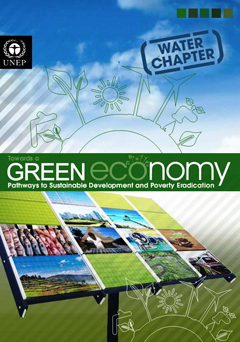 |
| Green Economy Report presents success stories. As part of its Five-Year Plan for Green Growth, the Republic of Korea, for example, announced a USD $17.3 billion investment in its Four Major Rivers Restoration Project in 2009. |
Stephen R. Carpenter, Professor of Zoology and Limnology at the University of Wisconsin-Madison, USA, received the 2011 Stockholm Water Prize by H.M. King Carl XVI Gustaf of Sweden for his groundbreaking research that showed how lake ecosystems are affected by the surrounding landscape and human activities.
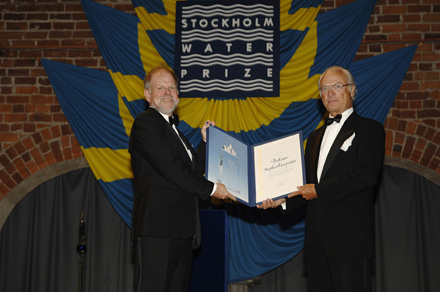 |
| Stephen R. Carpenter, Professor of Zoology and Limnology at the University of Wisconsin-Madison, USA, received today the 2011 Stockholm Water Prize by H.M. King Carl XVI Gustaf of Sweden for his groundbreaking research that showed how lake ecosystems are affected by the surrounding landscape and human activities. |
Global leaders convening at the opening session of the 2011 World Water Week in Stockholm called for increased investments in disaster-resilient infrastructure and smarter water management to avoid droughts, floods and pollution from further threatening the food, energy, and water security in a rapidly urbanizing world.
Global leaders convening at the opening session of the 2011 World Water Week in Stockholm called for increased investments in disaster-resilient infrastructure and smarter water management to avoid droughts, floods and pollution from further threatening the food, energy, and water security in a rapidly urbanizing world.
Providing basic facilities, including water and sanitation, but also transport and housing, in increasingly condensed urban areas will be one of the major challenges facing the world in the coming years
Up To 50% of Urban Residents in Sub-Saharan African Do Not Have Access to Clean Water and 60% Lack Adequate Sanitation
According to a new report released today by the Water and Sanitation Program (WSP) at the World Bank, African countries that transition to taking a leadership role in safe water and sanitation service delivery to the millions of people without access have an unprecedented opportunity to drastically reduce these numbers by 2015.
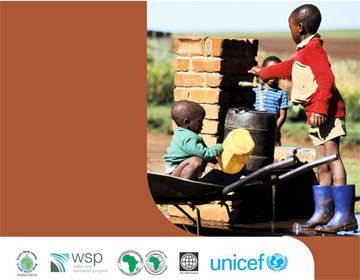 |
| The report, Pathways to Progress: Transitioning to Country-Led Service Delivery Pathways to Meet Africa’s Water Supply and Sanitation Targets, says economic growth, debt relief, and increasing political stability have opened up new opportunities for many African countries to take charge of their water supply and sanitation sectors and to develop sustainable s |
A mill in Sao Paulo, Brazil has become the first to have its sugar cane production certified under the new Bonsucro sustainability standard. “This will change the sugar cane industry forever,” said Kevin Ogorzalek, WWF-US program officer and Chairman of the Bonsucro Board.
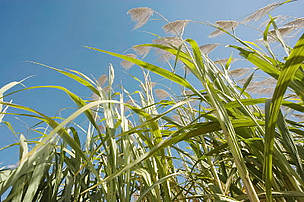 |
| In Uganda, waragi is distilled from sugar cane. |
Final Frontier: Newly Discovered species of New Guinea (1998 – 2008), a WWF study reports that 1,060 new species have been discovered the island of New Guinea from 1998 to 2008.
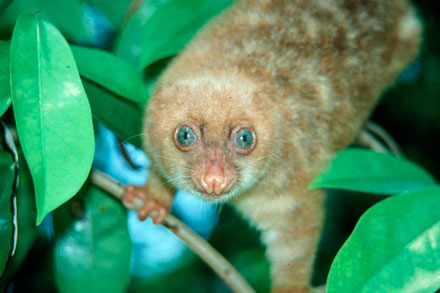 |
| Blue-eyed spotted cuscus (Spilocuscus wilsoni), Papua New Guinea. One new mammal species has been discovered in the region on average every year over the past ten years. The highest diversity of tree-dwelling marsupials in the world exists on New Guinea, with an incredible 38 species. |
The U.S. Environmental Protection Agency (EPA) today, August 12, 2011, announced that through its Greening America's Capitals (GAC) project, it will help the five capital cities to create healthy communities through green development.
 |
| A rooftop in Washington, DC, provides a good view of the U.S. Capitol. Photograph courtesy of U.S. EPA. |
The U.S. |
Matt Rand, director of global shark conservation for the Pew Environment Group, issued the following statement on August 8, 2011 in response to Chilean President Sebastián Piñera’s signing of Chile’s ban on shark finning.
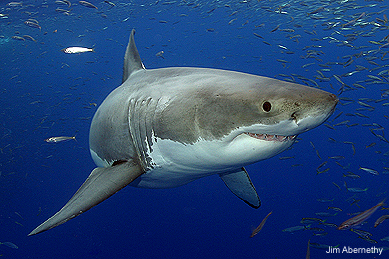 |
| Great white shark taken off of the coast of Mexico near Guadalupe. |
Search
Latest articles
Agriculture
- World Water Week: Healthy ecosystems essential to human health: from coronavirus to malnutrition Online session Wednesday 24 August 17:00-18:20
- World Water Week: Healthy ecosystems essential to human health: from coronavirus to malnutrition Online session Wednesday 24 August 17:00-18:20
Air Pollution
- "Water and Sanitation-Related Diseases and the Changing Environment: Challenges, Interventions, and Preventive Measures" Volume 2 Is Now Available
- Global Innovation Exchange Co-Created by Horizon International, USAID, Bill and Melinda Gates Foundation and Others
Biodiversity
- World Water Week: Healthy ecosystems essential to human health: from coronavirus to malnutrition Online session Wednesday 24 August 17:00-18:20
- Mangrove Action Project Collaborates to Restore and Preserve Mangrove Ecosystems
Desertification
- World Water Week: Healthy ecosystems essential to human health: from coronavirus to malnutrition Online session Wednesday 24 August 17:00-18:20
- UN Food Systems Summit Receives Over 1,200 Ideas to Help Meet Sustainable Development Goals
Endangered Species
- Mangrove Action Project Collaborates to Restore and Preserve Mangrove Ecosystems
- Coral Research in Palau offers a “Glimmer of Hope”
Energy
- Global Innovation Exchange Co-Created by Horizon International, USAID, Bill and Melinda Gates Foundation and Others
- Wildlife Preservation in Southeast Nova Scotia
Exhibits
- Global Innovation Exchange Co-Created by Horizon International, USAID, Bill and Melinda Gates Foundation and Others
- Coral Reefs
Forests
- NASA Satellites Reveal Major Shifts in Global Freshwater Updated June 2020
- Global Innovation Exchange Co-Created by Horizon International, USAID, Bill and Melinda Gates Foundation and Others
Global Climate Change
- World Water Week: Healthy ecosystems essential to human health: from coronavirus to malnutrition Online session Wednesday 24 August 17:00-18:20
- Mangrove Action Project Collaborates to Restore and Preserve Mangrove Ecosystems
Global Health
- World Water Week: Healthy ecosystems essential to human health: from coronavirus to malnutrition Online session Wednesday 24 August 17:00-18:20
- More than 400 schoolgirls, family and teachers rescued from Afghanistan by small coalition
Industry
- "Water and Sanitation-Related Diseases and the Changing Environment: Challenges, Interventions, and Preventive Measures" Volume 2 Is Now Available
- Global Innovation Exchange Co-Created by Horizon International, USAID, Bill and Melinda Gates Foundation and Others
Natural Disaster Relief
- STOP ATTACKS ON HEALTH CARE IN UKRAINE
- Global Innovation Exchange Co-Created by Horizon International, USAID, Bill and Melinda Gates Foundation and Others
News and Special Reports
- World Water Week: Healthy ecosystems essential to human health: from coronavirus to malnutrition Online session Wednesday 24 August 17:00-18:20
- STOP ATTACKS ON HEALTH CARE IN UKRAINE
Oceans, Coral Reefs
- World Water Week: Healthy ecosystems essential to human health: from coronavirus to malnutrition Online session Wednesday 24 August 17:00-18:20
- Mangrove Action Project Collaborates to Restore and Preserve Mangrove Ecosystems
Pollution
- Zakaria Ouedraogo of Burkina Faso Produces Film “Nzoue Fiyen: Water Not Drinkable”
- "Water and Sanitation-Related Diseases and the Changing Environment: Challenges, Interventions, and Preventive Measures" Volume 2 Is Now Available
Population
- "Water and Sanitation-Related Diseases and the Changing Environment: Challenges, Interventions, and Preventive Measures" Volume 2 Is Now Available
- "Water and Sanitation-Related Diseases and the Changing Environment: Challenges, Interventions, and Preventive Measures" Volume 2 Is Now Available
Public Health
- Honouring the visionary behind India’s sanitation revolution
- Honouring the visionary behind India’s sanitation revolution
Rivers
- World Water Week: Healthy ecosystems essential to human health: from coronavirus to malnutrition Online session Wednesday 24 August 17:00-18:20
- Mangrove Action Project Collaborates to Restore and Preserve Mangrove Ecosystems
Sanitation
- Honouring the visionary behind India’s sanitation revolution
- Honouring the visionary behind India’s sanitation revolution
Toxic Chemicals
- "Water and Sanitation-Related Diseases and the Changing Environment: Challenges, Interventions, and Preventive Measures" Volume 2 Is Now Available
- Actions to Prevent Polluted Drinking Water in the United States
Transportation
- "Water and Sanitation-Related Diseases and the Changing Environment: Challenges, Interventions, and Preventive Measures" Volume 2 Is Now Available
- Urbanization Provides Opportunities for Transition to a Green Economy, Says New Report
Waste Management
- Honouring the visionary behind India’s sanitation revolution
- Honouring the visionary behind India’s sanitation revolution
Water
- Honouring the visionary behind India’s sanitation revolution
- Honouring the visionary behind India’s sanitation revolution
Water and Sanitation
- Honouring the visionary behind India’s sanitation revolution
- Honouring the visionary behind India’s sanitation revolution

